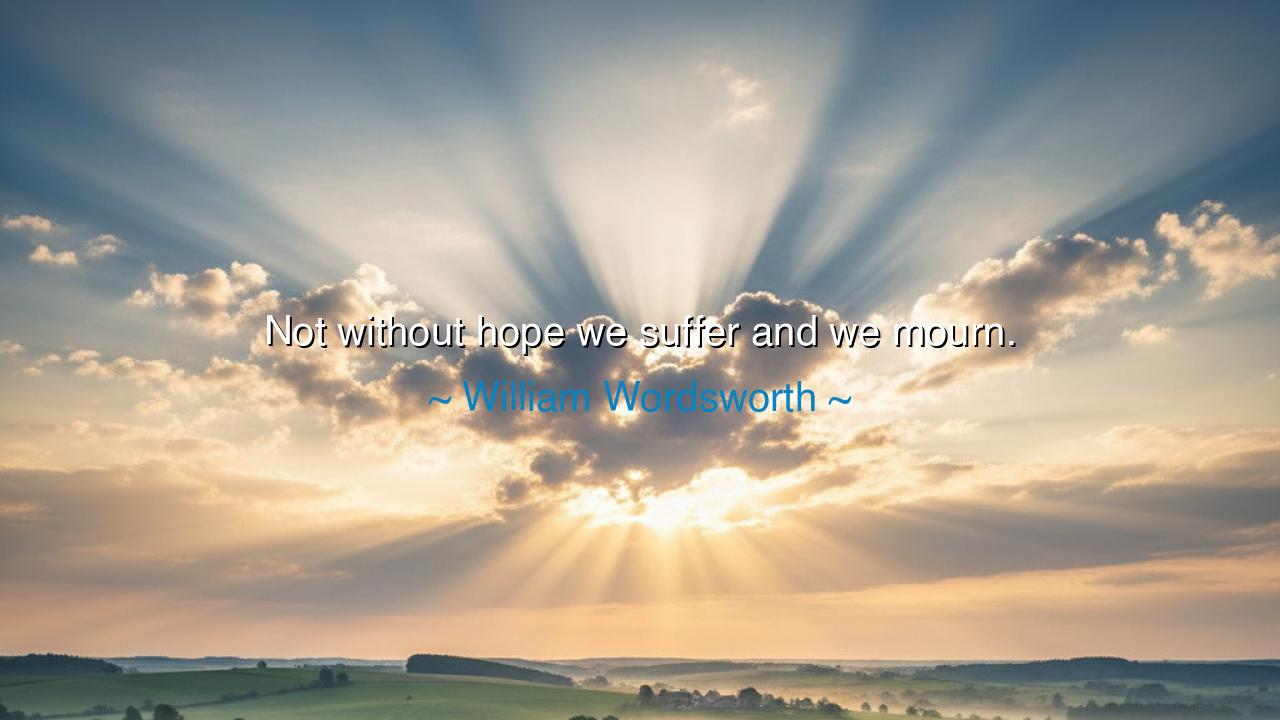
Not without hope we suffer and we mourn.






“Not without hope we suffer and we mourn.” Thus spoke William Wordsworth, the poet of nature and the human soul, whose words shine like morning light upon a valley of sorrow. In this single line, drawn from the depths of reflection and compassion, Wordsworth unveils one of the great paradoxes of life—that even in grief, even in the dark corridors of suffering, there flickers a hope that redeems the heart from despair. His words do not deny pain; they sanctify it. They remind us that to suffer is human, but to suffer with hope is divine.
For Wordsworth, who lived in the age of Romanticism, grief was not a curse to be hidden, but a teacher to be embraced. He believed that nature, in her vast and unbroken beauty, held a mirror to the human spirit. Even the withering of a leaf, the silence after a storm, or the death of a loved one spoke of renewal. When he writes that we “suffer and mourn not without hope,” he is telling us that loss is not the end of meaning. The world may take from us what we love, but in the rhythm of creation—of life, death, and rebirth—there remains the quiet promise that healing will come. Hope, then, is not denial of sorrow, but the light that lives within it.
The origin of these words can be traced to Wordsworth’s own life of beauty and bereavement. He knew loss intimately. The death of his parents when he was a boy, the passing of his children later in life, and the trials of war and human suffering that shadowed his generation—all these carved deep wells in his heart. Yet through them, he discovered a profound truth: that grief itself becomes sacred when held in the arms of hope. Nature, his constant companion, whispered this wisdom to him—the sun that sets always rises again; the winter that chills the earth is but the guardian of spring. Thus, his poetry became a hymn not to the absence of sorrow, but to the endurance of faith.
To understand this truth more fully, let us recall the story of Nelson Mandela, who endured twenty-seven years of imprisonment for his dream of freedom. In his confinement, he suffered and mourned—he lost his youth, his family, and nearly his life. Yet he did not despair. Like Wordsworth’s vision, Mandela’s suffering was not without hope. He believed that even from his cell, he was tending the soil of a better world. When he emerged at last, he carried no bitterness, only strength. His endurance shows that hope is not a luxury for the fortunate; it is the lifeblood of the human spirit, the power that transforms mourning into meaning and chains into freedom.
Wordsworth’s words are, therefore, not a comfort for poets alone but a universal truth for all souls. Every life will know loss; every heart will face sorrow. But within each sorrow lies a seed—the possibility of growth, compassion, and understanding. To suffer with hope is to accept that even pain has purpose. It refines us, deepens us, teaches us to love what we once took for granted. It opens the eyes of the heart to see that what is lost in one form may return in another: a lesson, a memory, a quiet strength.
In the ancient world, the philosophers of Greece spoke of pathos—the noble suffering that awakens wisdom. The Stoics, too, taught that we cannot choose what life brings, but we can choose how we bear it. Wordsworth’s line is the modern echo of this timeless insight. Hope does not erase grief; it transfigures it. It turns the wound into a window, through which we see not only the shadow of loss but the enduring light of life.
Thus, the lesson for those who walk this world is clear: do not flee from sorrow, but carry hope through it. When you suffer, remember that you are not alone in your pain. The earth itself has wept, and yet it blooms again each season. When you mourn, let your mourning be touched with gratitude—for what was, for what remains, and for what might yet be. Hope is the thread that binds the broken heart to the eternal fabric of life.
And so, Wordsworth’s words endure as a lantern for all who walk through the valley of grief. To live “not without hope” is to trust that even in the darkest hour, something sacred stirs within you. It is the whisper that says: This too shall pass. The dawn will come. The soul will rise again. Let hope be your companion, not because it promises ease, but because it gives meaning to endurance. For though we suffer and we mourn, we are never abandoned to despair. In the quiet places of our hearts, hope still sings—and through its song, life begins anew.






AAdministratorAdministrator
Welcome, honored guests. Please leave a comment, we will respond soon